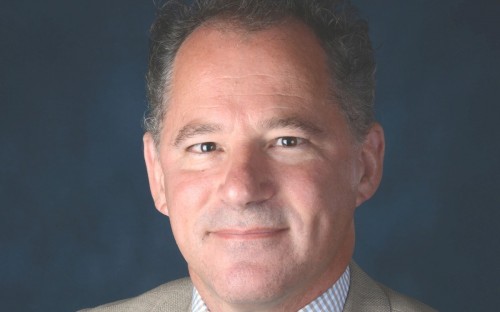The scene was the Leander Club in Henley, an hour’s drive outside London. Bill Barry, not content with a silver medal at Tokyo’s Olympic Games, was rowing with a clutch of Logica executives. It was a team-building exercise and John and his management team spent the day thrashing out their frustrations on the Thames.
“Bill ran a team building program and I was looking to take my team on a day [out],” John says, British accent beaming. “I was very impressed.”
A couple of years later, after sailing through the ranks at Logica, which was eventually acquired by CGI Group for £1.7 billion, he caught the entrepreneurship bug.
“I was going to set-up a coaching business and, because I hadn’t done this before, was looking for someone who had been round the block,” says John, who graduated from Aston’s MBA program back in 1991.
He gave Bill a call. “The particular niche we looked at was to specialize in seeing what business could learn from Olympic coaching.” And who better to join forces with than a man who has been coaching Team GB’s Olympic rowing team for a decade.
The pair co-founded 121 Partners in 2004. By 2007, they were finalists at the Business Start Up of the Year Awards. Executive coaching clients included Standard Chartered Bank, L'Oreal and Ford.
“We did grow and have a lot of success,” admits John, with all the charm befitting a man who coaches the world’s top chief executives.
But this is unsurprising for a graduate who has spent the past two decades carving out a successful career in everything from confectionary to business consulting.
After studying chemistry at the University of Nottingham, the British Gas scholarship student spent eight years at the energy major. The company paid for him to do a part-time MBA at the UK’s Aston Business School, studying two evenings a week – but he didn’t stick around for long afterward.
“The MBA gave me the confidence that I could step out and find a job,” he says with an air of caution. “The MBA helped in reassuring my new employers that I wasn’t just a gas expert, and that I had transferable skills.”
That new employer was Cadbury Schweppes, the global confectionery company famed for its chocolate brands including Wispa and Crunchie.
But John was not in the business of chocolatiers. The MBA graduate shot-up to international program manager and led the £12 million SAP implementation of Norsk Hydro, one of Norway’s largest companies, across UK, Norwegian and Swedish sites.
All the sweet treats in the world could not tempt him to stay, however, and after a stint advising Boots Healthcare in Europe, John left for a consulting career.
He joined Team 121, one of the UK's most successful SAP advisory firms, in 1996 where he stayed for three years. During part of his tenure as consulting director, the business grew from £9 million in turnover in 1996 to £36 million in 1999.
The firm was small, however, and it made for a difficult transition from the blue-chip public companies he had helped grow before. “Now I was in a 70-person entrepreneurial IT consultancy with a very young and talented workforce. It was a real steep learning curve to adapt,” says John.
That small team ethos did not last long. Logica acquired Team 121 for about £88 million in cash and shares in 1999. John was part of the management team that brokered the deal.
But he couldn’t shake the start-up spirit. “The freedom I experienced as a leader, to make decisions and back my own judgement… was very refreshing for me,” says John. “I had caught the entrepreneurial bug and that’s where I felt my heart would lie in the future,” he adds.
For the first two years after the Logica acquisition, he was locked-in. Still, it wasn’t all bad. As an international managing director, he helped grow the industry sector organically and by acquisition from a £200 million per annum business in 2001 to a £380 million per annum business in 2003.
His acquisition spree saw Logica absorb eGlobal Pacific's 1,800 consultants and the US’s Great Lakes Technology Group.
“I got the opportunity to do maybe the only role that had that element of entrepreneurial flair, and that kept me in Logica for much longer than I expected,” enthuses John.
In 2004 he became Logica's group director of executive coaching. At the time, it was the first such coaching role in a FTSE100 firm. It was an odd transition, but he had clearly discovered a passion for the profession.
After two years, however, he took a leap of faith. He founded the executive coaching practice 121 Partners with his Olympic champion, and business was seemingly booming.
John enjoyed something of a reputation for pioneering executive coaching – some of his Logica work was featured as a case study in a number of HR publications and conferences.
121 Partners hit a few bumps in the road, however. During the financial crisis, companies were less willing to splash out on coaching for their executives. Budgets were tightened. “We certainly took, like many of our competitors, a big hit at the time,” John deadpans.
After just shy of seven years, the founders closed operations down. Bill was approaching 70, John says, and to achieve their ultimate goals they would have to steer the company for another seven or eight years. He also received an offer to co-author a book, which was published as Challenging Coaching in April 2012.
“All these different reasons ultimately led to the most difficult decision I’ve had to make in my career, which was to bring to an end a company I co-founded. It was a gruelling time,” John says.
But he had no plans for retirement. The entrepreneur moved onto a new venture – although it is slightly different. John operates as an independent advisor, coaching board-level leaders in a bevy of leading companies including Network Rail and Capita.
He has not forgotten his business school roots. John is completing an executive doctorate at Aston, on CEO leadership. But he admits the MBA may have lost some of its lustre: “It’s become a more crowded market over time, and that has taken a bit of the uniqueness away.”
In August last year, he took up a board chair role with Vistage, the world's largest CEO organisation, which has 17,000 members in 16 countries.
“When I was doing that [running a company], you didn’t always have a network you could speak to and get help from,” says John. “I find it rewarding to bring CEOs together, share our experiences and challenge each other to be the best we can be.”
RECAPTHA :
81
56
c8
02







